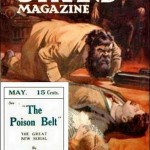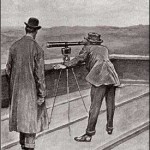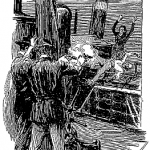“I don’t think any of them smell a rat,” he said. “Mortimer and Johnson pressed for their bill in rather an ugly manner, but I talked them over completely. I took out my cheque-book. ‘Look here, gentlemen,’ said I, ‘if you wish I shall write a cheque for the amount. If I do, it will be the last piece of business which we shall do together. A great house like ours can’t afford to be disturbed in the routine of their business.’ They curled up at once, and said no more about it. It was an anxious moment though, for if they had taken my offer, the whole murder would have been out.”
The old man started at the word his son had used, and rubbed his hands together as though a sudden chill had struck through him.
“Don’t you think, Ezra,” he said, clutching his son’s arm, “that is a very foolish saying about ‘murder will out’? I remember Pilkington, the detective, who was a member of our church when I used to worship at Durham Street, speaking on this subject. He said that it was his opinion that people are being continually made away with, and that not more than one in ten are ever accounted for. Nine chances to one, Ezra, and then those which are found out are very vulgar affairs. If a man of intellect gave his mind to it, there would be little chance of detection. How very cold the night is!”
“Yes,” returned his son. “It is best to talk of such things in the open air, though. How has all gone since you have been down here?”
“Very well. She was restive the first day, and wanted to get to
Bedsworth. I think that she has given it up now as a bad job.
Stevens, the gatekeeper, is a very worthy fellow.”
“What steps have you taken?” asked Ezra, striking a fusee and lighting a cigar.
“I have taken care that they should know that she is an invalid, both at Bedsworth and at Claxton. They have all heard of the poor sick young lady at the Priory. I have let them know also that her mind is a little strange, which accounts, of course, for her being kept in solitude. When it happens—”
“For God’s sake, be quiet!” the young man cried, with a shudder.
“It’s an awful job; it won’t bear thinking of.”
“Yes, it is a sad business; but what else is there?”
“And how would you do it?” Ezra asked, in a hoarse whisper.
“No violence, I hope.”
“It may come to that. I have other plans in my head, however, which may be tried first. I think that I see one way out of it which would simplify matters.”
“If there is no alternative I have a man who is ripe for any job of the sort.”
“Ah, who is that?”
“A fellow who can hit a good downright blow, as I can testify to my cost. His name is Burt. He is the man who cut my head open in Africa. I met him in London the other day, and spotted him at once. He is a half-starved, poor devil, and as desperate as a man could be. He is just in the key for any business of the sort. I’ve got the whip-hand of him now, and he knows it, so that I could put him up to anything. I believe that such a job would be a positive pleasure to him, for the fellow is more like a wild beast than a man.”
“Sad, sad!” Girdlestone exclaimed. “If a man once falls away, what is there to separate him from the beasts? How can I find this man?”
“Wire to me. Put ‘Send a doctor;’ that will do as well as anything else, and will sound well at the post-office. I’ll see that he comes down by the next train. You’d best meet him at the station, for the chances are that he will be drunk.”
“Bring him down,” said Girdlestone. “You must be here yourself.”
“Surely you can do without me?”
“No, no. We must stand or fall together.”
“I’ve a good mind to throw the thing over,” said Ezra, stopping in his walk. “It sickens me.”
“What! Go back now!” the old man cried vehemently. “No, no, that would be too craven. We have everything in our favour, and all that we want is a stout heart. Oh, my boy, my boy, on the one side of you are ruin, dishonour, a sordid existence, and the scorn of your old companions; on the other are success and riches and fame and all that can make life pleasant. You know as well as I do that the girl’s money would turn the scale, and that all would then be well. Your whole future depends upon her death. We have given her every chance. She laughed at your love. It is time now to show her your hate.”
“That is true enough,” Ezra said, walking on. “There is no reason why I should pity her. I’ve put my hand to the plough, and I shall go on. I seem to be getting into your infernal knack of scripture quoting.”
“There is a brave, good lad,” cried his father. “It would not do to draw back now.”
“You will find Rebecca useful,” the young man said, “You may trust her entirely.”
“You did well to send her. Have they asked for me much?”
“Yes. I have told them all the same story—nervous exhaustion, and doctor’s orders that you were not to be disturbed by any business letters. The only man who seemed to smell a rat was that young Dimsdale.”
“Ah!” cried the old man, with a chuckle; “of course he would be surprised at our disappearance.”
“He looks like a madman; asked me where you had gone, and when I answered him as I had the others, stormed out that he had a right to know, and that he would know. His blood was up, and there was nearly being a pretty scene before the clerks. He follows me home every evening to Eccleston Square, and waits outside half the night through to see that I do not leave the house.”
“Does he, though?”
“Yes; he came after me to the station to-day. He had a cravat round his mouth and an ulster, but I could see that it was he. I took a ticket for Colchester. He took one also, and made for the Colchester train. I gave him the slip, got the right ticket, and came on. I’ve no doubt he is at Colchester at this moment.”
“Remember, my boy,” the merchant said, as they turned from the door, “this is the last of our trials. If we succeed in this, all is well for the future.”
“We have tried diamonds, and we have tried marriage. The third time is the charm,” said Ezra, as he threw away his cigar and followed his father.




